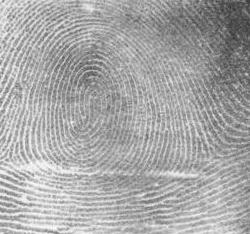
DNA profiling is the process of determining an individual's DNA characteristics. DNA analysis intended to identify a species, rather than an individual, is called DNA barcoding.

Sir Alec John Jeffreys, is a British geneticist, who developed techniques for genetic fingerprinting and DNA profiling which are now used worldwide in forensic science to assist police detective work and to resolve paternity and immigration disputes. He is a professor of genetics at the University of Leicester, and he became an honorary freeman of the City of Leicester on 26 November 1992. In 1994, he was knighted for services to genetics.

Forensic science, also known as criminalistics, is the application of science to criminal and civil laws, mainly—on the criminal side—during criminal investigation, as governed by the legal standards of admissible evidence and criminal procedure.

A fingerprint is an impression left by the friction ridges of a human finger. The recovery of partial fingerprints from a crime scene is an important method of forensic science. Moisture and grease on a finger result in fingerprints on surfaces such as glass or metal. Deliberate impressions of entire fingerprints can be obtained by ink or other substances transferred from the peaks of friction ridges on the skin to a smooth surface such as paper. Fingerprint records normally contain impressions from the pad on the last joint of fingers and thumbs, though fingerprint cards also typically record portions of lower joint areas of the fingers.

The Home Office (HO) is a ministerial department of Her Majesty's Government of the United Kingdom, responsible for immigration, security and law and order. As such it is responsible for policing in England and Wales, fire and rescue services in England, and visas and immigration and the Security Service (MI5). It is also in charge of government policy on security-related issues such as drugs, counter-terrorism and ID cards. It was formerly responsible for Her Majesty's Prison Service and the National Probation Service, but these have been transferred to the Ministry of Justice. The Cabinet minister responsible for the department is the Home Secretary.
A rape kit—also known as a sexual assault kit (SAK), a sexual assault forensic evidence (SAFE) kit, a sexual assault evidence collection kit (SAECK), a sexual offense evidence collection (SOEC) kit, or a physical evidence recovery kit (PERK)—is a package of items used by medical personnel for gathering and preserving physical evidence following an allegation of sexual assault. The evidence collected from the victim can aid the criminal rape investigation and the prosecution of a suspected assailant. DNA evidence can have tremendous utility for sexual assault investigations and prosecution by identifying offenders, revealing serial offenders through DNA matches across cases, and exonerating those who have been wrongly accused.

South Wales Police is one of the four territorial police forces in Wales. Its headquarters is in Bridgend.
The United Kingdom National DNA Database is a national DNA Database that was set up in 1995. In 2005 it had 3.1 million profiles, by 2015 it had 5.77 million and as of 2016 it has 5.86 million. The database, which was growing in 2007 by 30,000 samples each month, is populated by samples recovered from crime scenes and taken from police suspects although data for those not charged or not found guilty are deleted.

The CSI effect, also known as the CSI syndrome and the CSI infection, is any of several ways in which the exaggerated portrayal of forensic science on crime television shows such as CSI: Crime Scene Investigation influences public perception. The term was first reported in a 2004 USA Today article describing the effect being made on trial jurors by television programs featuring forensic science. It most often refers to the belief that jurors have come to demand more forensic evidence in criminal trials, thereby raising the effective standard of proof for prosecutors. While this belief is widely held among American legal professionals, some studies have suggested that crime shows are unlikely to cause such an effect, although frequent CSI viewers may place a lower value on circumstantial evidence. As technology improves and becomes more prevalent throughout society, people may also develop higher expectations for the capabilities of forensic technology.

Gwent Police is a territorial police force in Wales, responsible for policing the local authority areas of Blaenau Gwent, Caerphilly, Monmouthshire, Newport and Torfaen.
The Forensic Science Service (FSS) was a government-owned company in the United Kingdom which provided forensic science services to the police forces and government agencies of England and Wales, as well as other countries.

Surrey Police is the territorial police force responsible for policing the county of Surrey in South East England.
Harry Jackson was the first man to be convicted in the United Kingdom via fingerprint evidence.
A crime laboratory - often shortened to crime lab - is a scientific laboratory, using primarily forensic science for the purpose of examining evidence from criminal cases.
The following outline is provided as an overview of and topical guide to forensic science:
A DNA database or DNA databank is a database of DNA profiles which can be used in the analysis of genetic diseases, genetic fingerprinting for criminology, or genetic genealogy. DNA databases may be public or private, the largest ones being national DNA databases.
Forensic Services is a unit of the Metropolitan Police of London, England. Part of the Specialist Crime Directorate, their duties range from evidence recovery following burglaries to anti-terrorism work. It is divided into six units:
Gareth Wyn Williams was a Welsh mathematician and employee of GCHQ seconded to the Secret Intelligence Service who was found dead in suspicious circumstances at a Security Service safe house flat in Pimlico, London, on 23 August 2010. The inquest found that his death was "unnatural and likely to have been criminally mediated." A subsequent Metropolitan Police re-investigation concluded that Williams's death was "probably an accident". It is suspected that he was killed by Russian assassins on British soil. Two senior British police sources have said some of Williams's work was focused on Russia – and one confirmed reports that he had been helping the NSA trace international money-laundering routes that are used by organised crime groups including Moscow-based mafia cells.
The Science and Technology Branch is service within the Federal Bureau of Investigation that comprises three separate units. These are Forensic Science, Operational Technology, and Information Sharing. The goal when it was founded in July 2006 was to centralize the leadership and management of the three units. The mission of the STB is discover, develop, and deliver innovative science and technology so that intelligence and innovative investigation is enhanced.
The National Forensic DNA Database of South Africa (NFDD) is a national DNA database used in law enforcement in South Africa. The Criminal Law Amendment Act No. 37 of 2013 provides for the expansion and administration of such a database in South Africa, enabling the South African Police Service (SAPS) to match forensic DNA profiles derived from samples collected at crime scenes with forensic DNA profiles of offenders convicted of, and suspects arrested for, offences listed in a new Schedule 8 of the amended Criminal Procedure Act of 1977.









